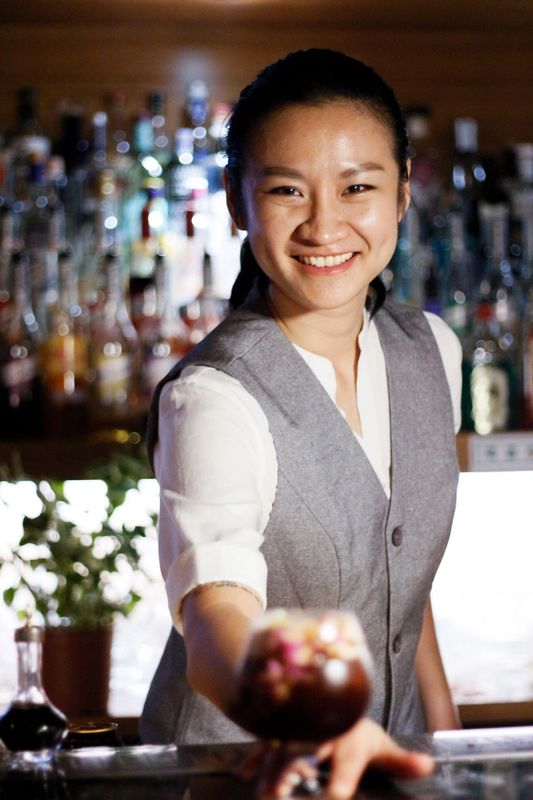Words Nicolaj Lenz | Photo Sebastian Coman
Can chefs evolve from foul-mouthed managers to be leaders? Can anyone?
When I got my first official sous chef position, it was in an intimate luxury relais & chateaux hotel in America. Our chef had an opening and decided to split the position in two. He made me and my best buddy, who cooked alongside me, Co-Sous Chefs. Both of us had worked under the classic ‘kitchen brigade’ style of management set forth by old school French, Spanish and Italian chefs.
But now we were in California!
The Chef was an east-coaster, from Chicago, an old Charlie Trotter alumni, who had gone to make his mark on the west coast. He had then married into the hotel owner’s family. Most of the time, he was in the office. Next to that, he was an insulation layer between us and the owner, as well as other assorted top management. We were young cooks, crazy eager to cook the socks off anyone, and beat the competition; any competition really – you name it, we would beat it.
Chefs leadership was quiet but creative and technical. Whenever he comes into the kitchen, he would hover where needed; mostly for small training sessions or new ingredient testing. He didn’t run service – that was left to us, instead, he seemed to prefer to walk around the dining rooms to do the meet-and-greet, alongside the owner. We sort of had the kitchen to ourselves. It was our baby to run!
I had flown in from a restaurant in Florence, Italy. My buddy had told me to come and join him. I soon had my first taste of the chef’s style of teaching during my first week in his kitchen. With my Italian experience, I had been asked to do the rice part of a special risotto dish to go on our daily set menu. However, the chef had started to hover around as I was cooking. I hadn’t officially been named co-sous chef yet, and his hovering began to make me worry. Then, he carefully tasted the risotto. For me, the tasting felt like an eternity. Then he said, “This is very very tasty! Would you mind if we serve this to the team today as a staff meal? They really must try this style of risotto!” He ate a bit more, then added; “For now, I’ll show you another way to cook a risotto that fits into the way Californians here are used to.” During the staff mealtime, Chef stood up and explained the style of risotto I had made to the team and asked them to compare it with the “Californian style” that he used. It started a team sharing session that I still remember positively today.
A few months later, now in our official roles as co-sous chefs, we had a very big and important event; the kind that is intimidating but makes owners giddy with happiness. Once the owner felt tense, so did everyone else. And that’s not all – our executive chef was not present; he was on his way, returning from the east coast, after having had to attend to some family emergency.
The kitchen team, had done careful food preparations for a week already, with the chef on the phone, several times a day. And we felt that all was well in the kitchen. However, the owner, top managers and senior front of house staff became more and more stressed and visibly worried. Their energy seemed to scream; “How can all be well? We have these two young cooks sharing the sous chef position, while our executive chef is still in the air flying back?” This got worse as VIP guests began to arrive during the afternoon while the welcome canapes were served.
Finally, we were told that the chef had landed at the nearby airport. Canapes service is done and guests started to take their seats in the ballroom. Every minute brought more simmering tension among all executives. After what seemed like a long time, Chef burst into the kitchen; half pushed and half purposefully striding – putting on his chef whites as he approached. He was surrounded and urgently spoken to by the owner, her husband and three head waiters. Us cooks stared at this throng of top management approaching. I remember my co-sous chef was calmly skimming one of our large stockpots slowly and carefully, in preparation for the next few days of service. Probably to emphasize, a bit arrogantly, that we were extremely ready.
Chef approached us as he buttoned the top of his chef whites. Senior management, highly restless around him turned their gaze to us. The chef came over to the two of us and then he asked, “Menu set up is as we agreed before my flight, yes?”
“Yes, chef!”
“Seating chart updated with backroom waiters?”
“Yes, chef!”
“All is seasoned by both of you? All textures controlled and warm plates ready? Counted?”
“Yes, chef!”
He paused. Asked the lead host for any guest changes or dietary restrictions possibly not communicated to the kitchen. All was well in front, he was told. Chef then looked at us again and said, “I will return for service if I hear you ask for me!”
“Yes, chef!”
The service went perfect and smooth. I honestly do not remember the food we cooked that day. But I do remember the moment when we saw the chef next. He came into the kitchen, as the very last desserts went out. Handing us a bottle of champagne – from him and the owner, he said but we knew it was from him!
When your team is from Venus and you are from Mars. How to understand each other?
Our chef knew his team more than we were aware of at the time. You can say he had “read the kitchen” for a few qualities that he looked for. He labelled us Creators vs Engines and Listeners vs Speakers.
“Creators” are the sort of cooks that get excited about learning new skills. Enjoy technical changes and new challenges daily. They get bored easily but do not mind adjusting their coffee breaks for new things.
“Engines” can also be extremely skilled, however, are mostly happy just cooking away. Do not disrupt them too much, just let them repeat the chores they excel at. Also, please do not mess with their coffee breaks.
“Listeners” once empowered, can delegate and organize in smooth and systematic ways. Whatever your definition of perfection is, they know the guidance and mentoring work needed towards that goal. Perfection is understood to be a daily moving target that must be achieved by concerted effort.
“Speakers” can be very good at organizing and take charge even without anyone telling them to. Perfection is defined by them and is all that matters, even at the cost of things and people if necessary. Some of these “Speakers” believe they are great leaders, often because they have somehow talked themselves into a position of authority.
Know your audience, use visions, give trust and then CHASE AWAY your version of PERFECTION
The chef took time to get to know his team members, chatting and questioning about this and that. Not wasting his time mind you, he was carefully evaluating their current skill set. He conveniently scheduled his time alongside new cooks. Getting them to share as much as they dared. Time, he said was well spent. In a nutshell, he cooked but listened more.
Soon, he encouraged and pushed the new cooks by letting them show off their skills doing various important tasks, that he needed them to take care of personally for him, just like my risotto.
“Today’s menu” was his constant goal always. He would not let anyone lose sight of that. Followed by “tomorrow’s menu” as soon as we approached today’s deadlines.
The menu had to be well-composed, each dish was always spoken of in organic terms. He used the ultimate word “perfection” carefully to describe what he had in mind. There were ‘fifty shades of grey’ to taste and texture, ultimate perfection in our kitchen. “Grey” being delicious, was non-negotiable the “shades” were somewhat more malleable. The daily menu was not created to be a perfect menu – it was set as a range of experiences with different “perfect” moments in it.
Each dish in the menu was like targets, he needed the cooks to commit to, section by section.
Having a menu with a lot of different shades of “perfect,” ensured that we did not panic or fly into a rage when some guests liked some less than others. It was never a complete disaster to receive a subjective complaint, in fact, it is always a valuable moment to identify and recommit. All we have to do as leaders, for any valid complaint, was to engage in a practical solution and once that was found, move on – mistakes remembered and learned from. Chefs will have to commit to lifting team skills where needed and growth is expected.
Culinary freedom is very empowering but it is a serious business.
In kitchens, you rarely have enough time but you have a lot of ‘micro’ moments.
We learn to look for these micro-moments – the seconds to minute moments; we need to adjust and coach the team. We learn to shift between direct eye-ball leadership to a helicopter view, which requires lots of awareness.
Each day, we had to prepare first as leaders. This meant, that we would have a quick daily five-minute issue-huddle with the chef. Dissecting any minor to bigger issues or guest complaints. We had many other meetings too, but these hurdles were the most important to the chef.
“Issue-huddles” allowed us to have a wider selection of goals in mind before any conversation with the staff – and to listen more and speak less. Often, cool co-created solutions appeared once we engaged with the team. We learned that the team, do not need to hear solutions for everything.
They agree solutions hold better when the team members suggested them. That shows only one thing – ownership works!
Our eyeball-leadership begin to grow as we started to use the micro-moments – spending the micro-moments with two agendas in mind – ‘elevate’ or ‘celebrate.’ To elevate, a situation would be to correct what might have gone wrong and ensure the right solution then and there; preferably listening for the solution rather than imposing it. Celebrate something great – from a quick fist bump and eye contact in passing, to a deeper dive into something outstanding, worth extra attention and involve the team at large.
Our awareness of how to use the micro-moments made our communication more visionary. We often painted bigger pictures and listened way more. Today it is clear that careful words and the time taken to clarify the reason behind either an elevation or a celebration takes preparation and extra awareness. The two vital steps if you want to be the leader and not just a manager; it takes more work, skill and self-commitment to become a proper leader.
An executive chef’s (or leaders) workload is very much people-oriented rather than ingredient oriented. A quick pun would be that a farmer nurtures ingredients and a chef should nurture the cooks. To stay in the farming analogy; we should grow a diverse set of personalities and skills in our teams. Not looking for “same-same” mono-crops. Give space and allow unique characters to be a part of the team. From time to time, there will occasionally be a bit of a ‘weed’ disturbing our perfect little ‘garden.’ However, avoid cutting the “weed” off too quickly. Helicopter patience along with eye-ball effort and accepting that this equals lots of manual labour and the right “fertilizer” types such as organised coaching and lots of empowerment.
One time a newly hired chef de partie, complained and asked my co-sous chef why he kept pestering him at his section and so my buddy responded, “Dude, think of it like this, I just go where we see the need to help. I am supposed to run the hotline tonight. But now I am here with you, help me get back to the hotline!” This cook later became good at lending his focus to other sections in the kitchen at risk of falling behind.
And guess what, he later earned the sous chef position after we moved on.






